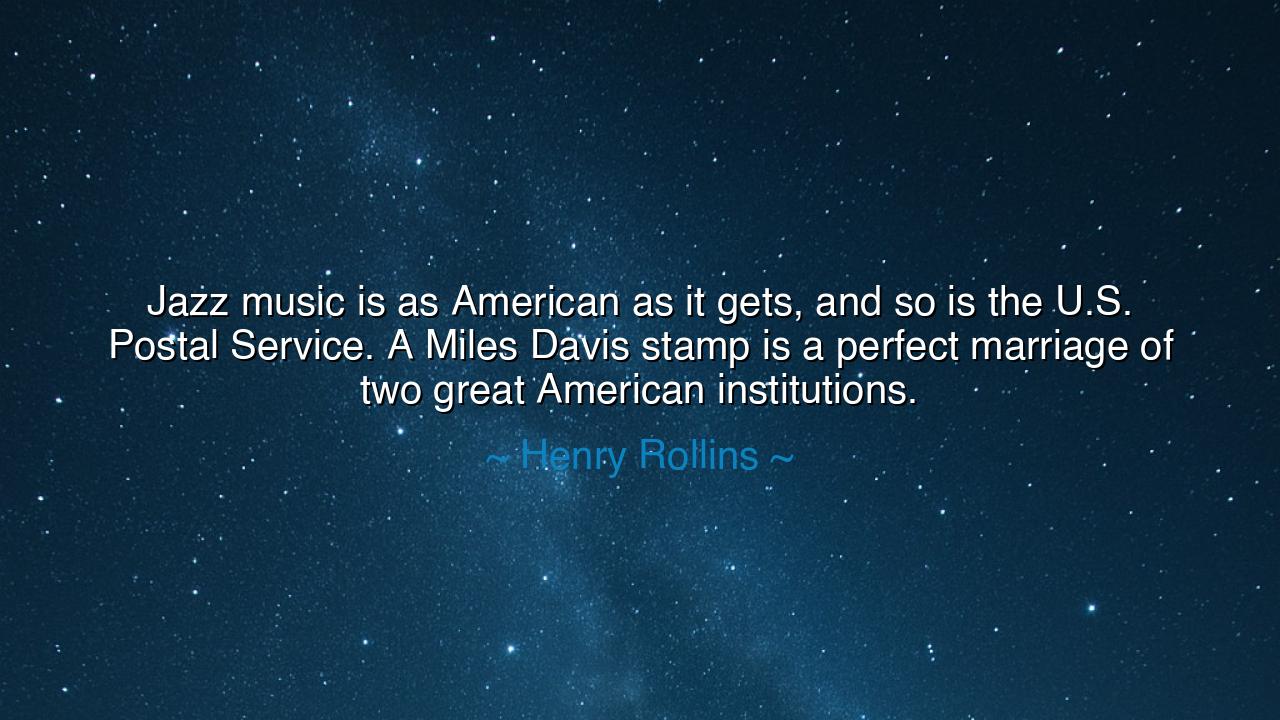
Jazz music is as American as it gets, and so is the U.S. Postal
Jazz music is as American as it gets, and so is the U.S. Postal Service. A Miles Davis stamp is a perfect marriage of two great American institutions.






In the words of Henry Rollins, “Jazz music is as American as it gets, and so is the U.S. Postal Service. A Miles Davis stamp is a perfect marriage of two great American institutions.” These words are deceptively simple, yet they hold within them a reflection on culture, history, and identity. Rollins reminds us that jazz, born from struggle and genius, and the postal service, born from civic necessity, are not merely institutions but embodiments of the American spirit. When they meet in the form of a postage stamp honoring Miles Davis, it is not just ink on paper, but the symbolic joining of art and nationhood.
Jazz itself is the child of America’s paradoxes. It rose from the pain of slavery, from the rhythms of Africa carried across oceans, from the laments of the blues and the syncopations of ragtime. It became a sound of resilience, of improvisation, of voices that could not be silenced. In honoring Miles Davis—one of the great architects of modern jazz—America honors not just a man, but the heritage of those who transformed suffering into beauty, division into harmony. Jazz is freedom set to sound, and in that freedom, it is the most American of arts.
The U.S. Postal Service, too, is no small matter. It was one of the first acts of a young republic, binding together a vast and scattered land. Through storm and war, through mountains and plains, the postal rider carried the messages of a people, ensuring connection and unity. It democratized communication, allowing farmer and president alike to send their words across the land. To compare jazz with the postal service is to recognize that both have been vehicles of connection—one through the written word, the other through sound.
History gives us a powerful mirror in Louis Armstrong. He, like Miles Davis, carried jazz across the globe, becoming not just a musician but an ambassador of America’s cultural soul. When Armstrong played his trumpet in Europe, in Africa, in Asia, people heard more than music—they heard America itself, raw and alive, flawed yet free. Just as the postal service carried letters beyond borders, Armstrong carried jazz into the world, stitching humanity together with notes instead of envelopes.
Rollins calls the Miles Davis stamp a “perfect marriage,” for it joins two forms of recognition. A stamp, humble yet official, speaks of permanence, of the nation’s acknowledgment. Jazz, ephemeral and improvisational, speaks of creativity, of the individual spirit. Together they form a union of order and freedom, of the state and the artist, of the lasting and the fleeting. In this marriage, America honors both its institutions and its rebels, both the systems that hold it together and the voices that push it forward.
The deeper lesson is that true nations are not built only on laws, armies, and governments, but on culture and art. The postal service may unite a country physically, but music unites it spiritually. To honor jazz through a stamp is to admit that America is more than its Constitution—it is also its melodies, its improvisations, its cultural daring. In this, Rollins speaks a wisdom that the ancients knew: that a people are remembered not by their taxes or their borders, but by the art and stories they leave behind.
Practical steps flow from this truth. Honor the artists who shape your culture, for they are the true ambassadors of your spirit. Protect the institutions that connect people, whether through letters, roads, or digital networks, for without connection, a nation dissolves. Learn from jazz itself—its improvisation, its dialogue, its balance of freedom and structure. And above all, support the marriage of art and civic life, ensuring that your society does not relegate culture to the margins, but lifts it up as central to who you are.
Thus, Henry Rollins’ words remind us that a simple stamp can carry profound meaning. In placing Miles Davis on a U.S. postage stamp, America declares that jazz is not only a music, but a monument; not only a song, but a symbol of what it means to be free, connected, and alive. Let us carry that lesson forward: that our truest heritage lies in the union of what sustains us and what inspires us, in the perfect marriage of our institutions and our imagination.






AAdministratorAdministrator
Welcome, honored guests. Please leave a comment, we will respond soon